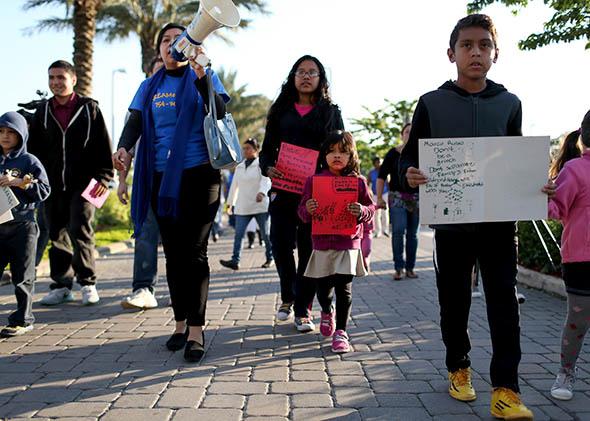The Republican Senate majority is due in part to the defeat of former North Carolina Democratic Sen. Kay Hagan. Her loss was due in part to the fact that Hispanic voters made up just about 3 percent of that state’s midterm electorate last November. According to some, the fact that so few Hispanics came out for Hagan was due in part to the fact that she, in a seemingly desperate bid to tack to the political center, spoke out against President Obama’s plans to take executive action to defer deportation for millions of undocumented immigrants. In Washington, nothing’s not about immigration.
The activist group Presente Action leveled blistering criticism at four incumbent Democrats in the lead-up to the 2014 midterms, charging that they were insufficiently supportive of policy changes intended to help undocumented immigrants. Arturo Carmona, Presente Action’s executive director, announced a month before Election Day in a Real Clear Politics op-ed that his organization was encouraging its members to vote against four Democrats—Hagan, Louisiana’s Mary Landrieu, Arkansas’ Mark Pryor, and New Hampshire’s Jeanne Shaheen. Of the four, only Shaheen won her re-election.
“[A]fter a string of broken promises, the Democrats have much work to do to win back the trust of Latino voters before 2016,” he wrote at the time. “The Democratic Party is not our friend simply because members of the Republican Party have worked so hard to become our enemy.”
On Capitol Hill, immigration issues never say die. And since the Department of Homeland Security will run out of funding on Feb. 27, members of Congress are scrambling to find a way to pay for the organization’s budget without alienating their most powerful constituencies. For Republicans, this means looking for a way to use the DHS funding fight to block the implementation of the president’s executive action on immigration (the same executive action that proved politically fatal for Hagan last year).
“If the Latino vote had come out strongly for Kay Hagan, she would have won,” Carmona said. He may be right: Hagan lost her re-election contest by fewer than two percentage points.
Republicans’ immigration conundrum is painfully obvious. Moderate Republicans allied with business interests and seeking more support from Hispanic voters are in a permanent tug of war with Tea Party–allied members of the House and Senate who adamantly oppose any immigration reform that would give undocumented immigrants a route to U.S. citizenship. Many of these Republicans have also pledged to vote against any legislation that would increase legal immigration levels—which the Hill’s Jeb Bush types see as political lunacy.
Ultimately, though, moderate Hill Republicans know they’ll face dark electoral days if they alienate the immigration-hawk sector of their base. On top of that, Republican National Committee Chairman Reince Priebus promised in the lead-up to the midterms that the GOP would “do everything we can” to block implementation of the president’s executive action. Thus, when Republicans approach the DHS funding immigration issue, there’s lots of cringing and word-mincing.
But that’s not to say the politics of DHS funding are a breeze for Democrats. The political carcasses of Hagan, Pryor, and Landrieu are stark reminders of a new political reality: Progressive activists are using Tea Party–style tactics to keep elected Democrats in line.
Carmona told Slate that his organization will keep cracking down on potentially squishy Democrats by any means necessary—even if that means backing primary challengers.
“If Democratic elected officials are opposing or remaining silent or not showing leadership on issues that are important to Latinos, then all options should be open,” he said, “including backing primary opposition.”
Many outside groups seek to cozy up with one of the two parties, preferring the carrot to the stick as they jockey for influence. Not so with Presente Action. Even in the case of Obama’s executive action, Carmona hesitated to give the president too much credit.
“It was an action that Latinos demanded through protests and rallies and years of organizing,” he said. “It didn’t happen through the good faith of political leaders, but because Latinos demanded it.”
Tea Partiers have long used that kind of rhetoric and political strategy to drive moderate Republicans berserk. Any sort of cave from elected Democrats on DHS funding, and they could face their own insurrection boomlets.
Clarissa Martínez-De-Castro, deputy vice president at the National Council of La Raza, echoed that sentiment.
“These two programs, the expansion of [Deferred Action for Childhood Arrivals] and the new DACA program, are the only lifeline millions of American families have gotten in about two decades,” she said, referring to programs that defer deportations for some undocumented immigrants. “People are going to be looking very closely at who’s holding the scissors if this lifeline gets cut.”
